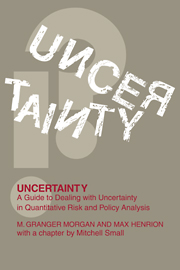Book contents
- Frontmatter
- Contents
- Preface
- 1 Introduction
- 2 Recent Milestones
- 3 An Overview of Quantitative Policy Analysis
- 4 The Nature and Sources of Uncertainty
- 5 Probability Distributions and Statistical Estimation
- 6 Human Judgment about and with Uncertainty
- 7 Performing Probability Assessment
- 8 The Propagation and Analysis of Uncertainty
- 9 The Graphic Communication of Uncertainty
- 10 Analytical A Software Tool for Uncertainty Analysis and Model Communication
- 11 Large and Complex Models
- 12 The Value of Knowing How Little You Know
- Index
3 - An Overview of Quantitative Policy Analysis
Published online by Cambridge University Press: 05 June 2012
- Frontmatter
- Contents
- Preface
- 1 Introduction
- 2 Recent Milestones
- 3 An Overview of Quantitative Policy Analysis
- 4 The Nature and Sources of Uncertainty
- 5 Probability Distributions and Statistical Estimation
- 6 Human Judgment about and with Uncertainty
- 7 Performing Probability Assessment
- 8 The Propagation and Analysis of Uncertainty
- 9 The Graphic Communication of Uncertainty
- 10 Analytical A Software Tool for Uncertainty Analysis and Model Communication
- 11 Large and Complex Models
- 12 The Value of Knowing How Little You Know
- Index
Summary
Modest doubt is called the beacon of the wise.
William Shakespeare, Troilus and Cressida, II, ii, 56There is something wonderfully absorbing about the details of policy analysis and policy-focused research. Indeed, the balance of this book will be devoted to a discussion of just one set of details, those related to the characterization and treatment of uncertainty. But, before proceeding, we should explore some broader issues. We need to clarify what we mean by policy analysis and policy research, and we must ask “What constitutes good policy analysis?” We first do this indirectly by comparing policy analysis to scientific research. Then we explore the role of analysis in the process of developing and choosing policy alternatives, examine a variety of alternative philosophical frameworks within which analysis may be undertaken, and explore some of the problems of choosing the boundaries for a policy analysis. Finally, we return to the problem of identifying the attributes of “good” policy analysis. This time our approach is more direct. We examine the motivations people have in commissioning and undertaking analysis and work from these motivations to develop what we term “ten commandments” for good policy analysis, one of which involves being explicit about uncertainties. The chapter concludes with a discussion of when and why policy analysis should deal with uncertainty.
Policy Research and Policy Analysis
Throughout the preceding chapters we have referred to policy research and analysis, sometimes using the even more awkward phrase “policy analysis and policy-focused research.”
Information
- Type
- Chapter
- Information
- UncertaintyA Guide to Dealing with Uncertainty in Quantitative Risk and Policy Analysis, pp. 16 - 46Publisher: Cambridge University PressPrint publication year: 1990
Accessibility standard: Unknown
Why this information is here
This section outlines the accessibility features of this content - including support for screen readers, full keyboard navigation and high-contrast display options. This may not be relevant for you.Accessibility Information
- 4
- Cited by
